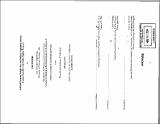| dc.contributor.advisor | Cindy Williams. | en_US |
| dc.contributor.author | Hitchings, Sean, 1975- | en_US |
| dc.contributor.other | Massachusetts Institute of Technology. Technology and Policy Program. | en_US |
| dc.date.accessioned | 2006-03-24T18:16:57Z | |
| dc.date.available | 2006-03-24T18:16:57Z | |
| dc.date.copyright | 2004 | en_US |
| dc.date.issued | 2004 | en_US |
| dc.identifier.uri | http://hdl.handle.net/1721.1/30072 | |
| dc.description | Thesis (S.M.)--Massachusetts Institute of Technology, Engineering Systems Division, Technology and Policy Program, 2004. | en_US |
| dc.description | Includes bibliographical references (leaves 101-107). | en_US |
| dc.description.abstract | The military aircraft industry is a cornerstone of national security and of the economic health of the United States. The Joint Strike Fighter (JSF) program was sold as a solution to a host of needs, from advancing the capabilities of each Service, modernizing an aging fleet, countering sophisticated threats, enhancing inter-service cooperation, and implementing acquisition reform, all in a revolutionarily cost-effective way. Because of this tantalizing promise, the early JSF program was able to navigate through budgetary pressures while other aircraft programs were cancelled. This thesis argues that the JSF program is a manifestation of a collective action problem, wherein stakeholders, who should be providing a check on each other, are cooperating, even as the stakeholder who should be participating, remains uninvolved. Consequently, the acquisition policies brought in with the JSF program are not improving acquisition policy, but are exacerbating the inefficiencies to which the U.S military acquisition system has historically been prone. This analysis provides insight into how to improve the technology policies governing military aircraft acquisition, and the supply of aircraft to other nations. This analysis is geared for senior policy makers in both government and industry, as well as those who guard the public interest. | en_US |
| dc.description.statementofresponsibility | by Sean Hitchings. | en_US |
| dc.format.extent | 107 leaves | en_US |
| dc.format.extent | 7222086 bytes | |
| dc.format.extent | 7221895 bytes | |
| dc.format.mimetype | application/pdf | |
| dc.format.mimetype | application/pdf | |
| dc.language.iso | eng | en_US |
| dc.publisher | Massachusetts Institute of Technology | en_US |
| dc.rights | M.I.T. theses are protected by copyright. They may be viewed from this source for any purpose, but reproduction or distribution in any format is prohibited without written permission. See provided URL for inquiries about permission. | en_US |
| dc.rights.uri | http://dspace.mit.edu/handle/1721.1/7582 | |
| dc.subject | Technology and Policy Program. | en_US |
| dc.title | Political economy insights into the defense acquisition process : lessons from the Joint Strike Fighter Program | en_US |
| dc.type | Thesis | en_US |
| dc.description.degree | S.M. | en_US |
| dc.contributor.department | Massachusetts Institute of Technology. Engineering Systems Division | |
| dc.contributor.department | Technology and Policy Program | |
| dc.identifier.oclc | 55636167 | en_US |
